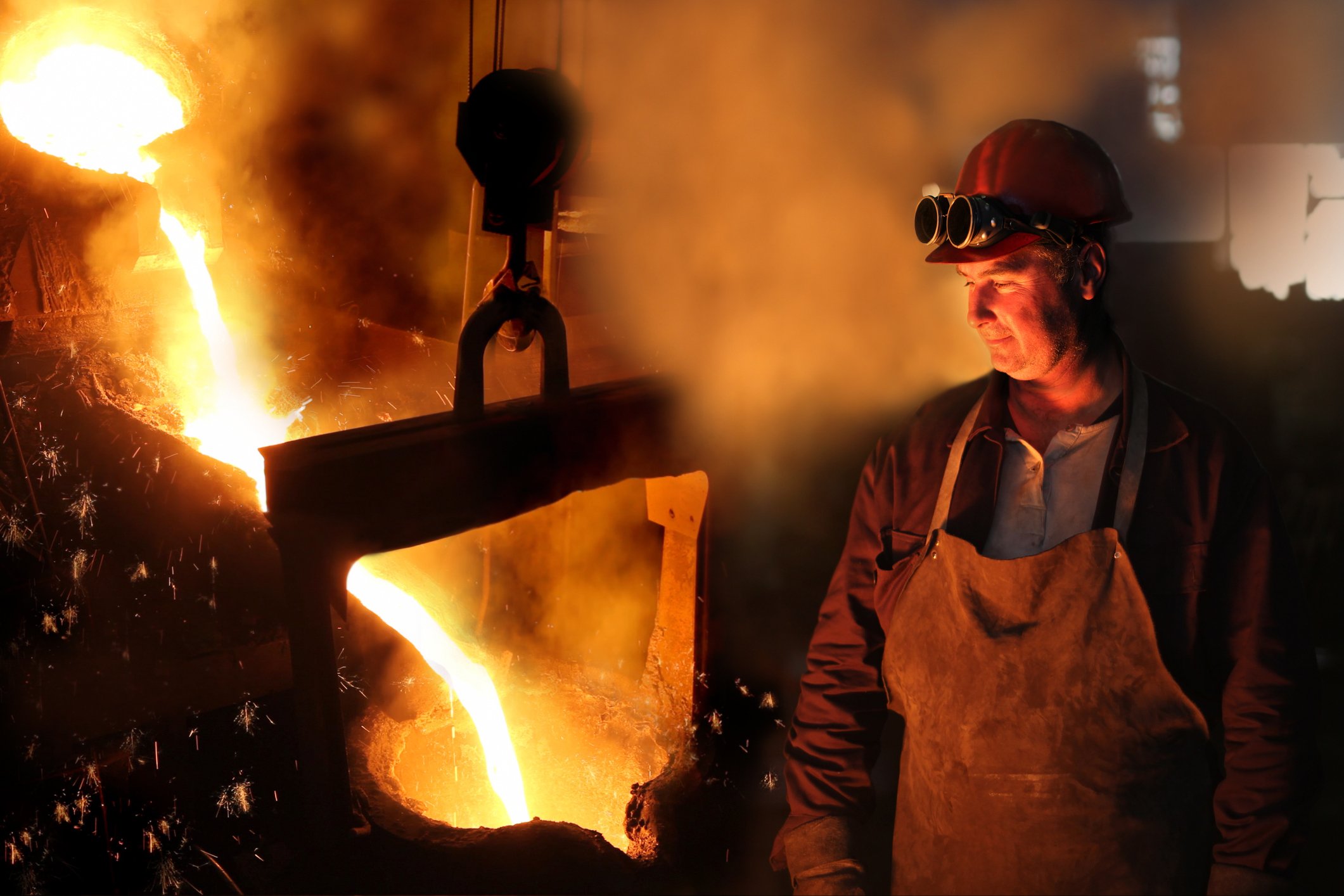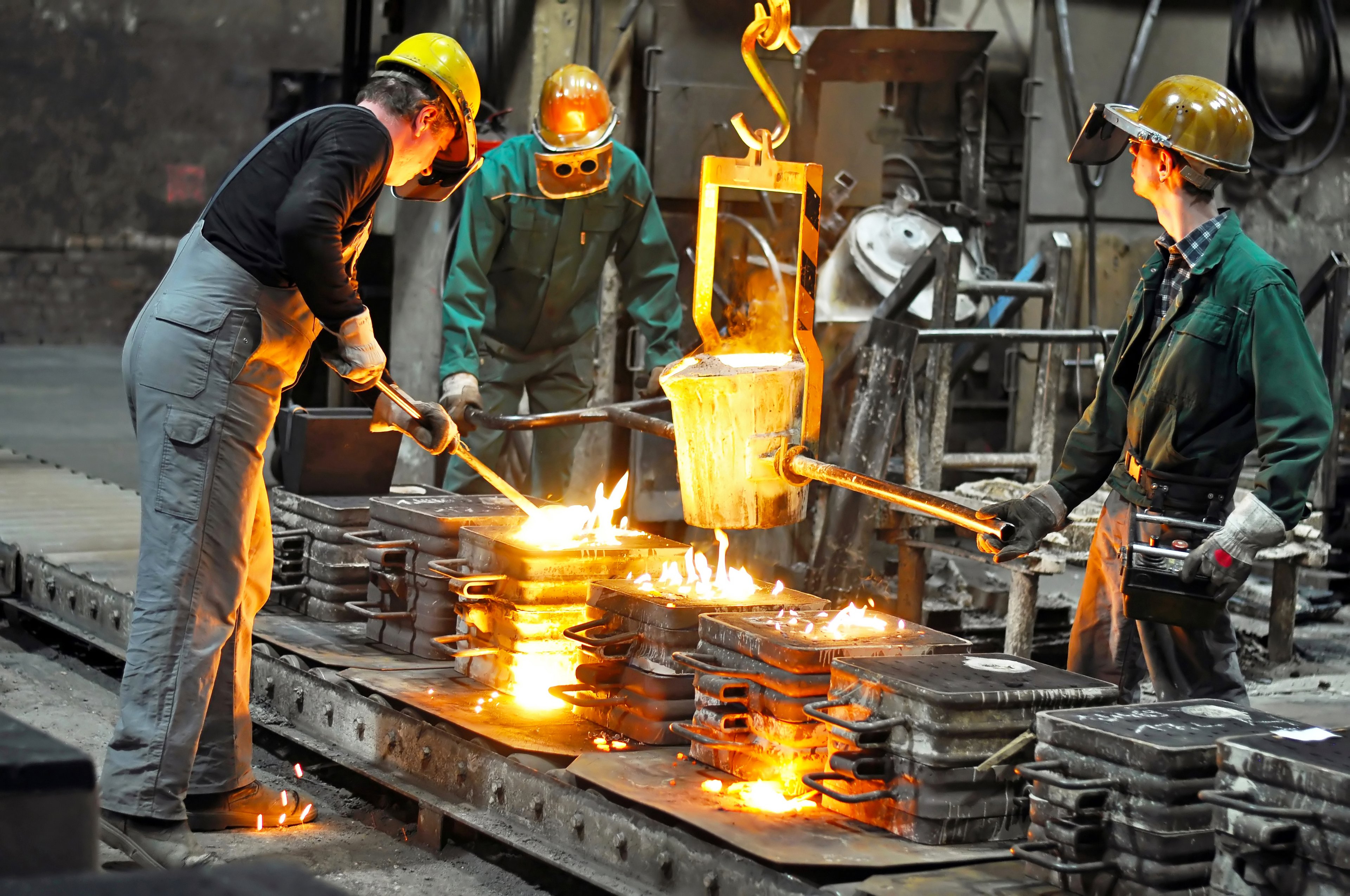Cleveland-Cliffs (CLF 1.54%) is one of North America's largest iron ore producers. AK Steel (AKS +0.00%) is one of North America's largest primary steel producers. Put them together and you get an integrated steel company -- but it remains to be seen if you actually get a better company. Here's why investors should think twice before getting excited about Cleveland-Cliffs' offer to buy AK Steel.
A quick overview
For more than 100 years, Cleveland-Cliffs has been producing iron ore in North America. Its primary customers are steel companies like AK Steel. Iron ore, however, is a commodity subject to price swings based on supply and demand. So its business tends to be cyclical.

image source: Getty Images.
That's not surprising, given that demand comes from steelmakers like AK Steel. Steelmakers sell to economically sensitive industries like construction and automobile manufacturing. As these cyclical businesses wax and wane with the economy, so does AK Steel's business. And so, in turn, does the need for iron ore pellets from suppliers like Cleveland-Cliffs.
When Cleveland-Cliffs announced its intention to buy AK Steel, it highlighted that the merger would create a vertically integrated steelmaker. Essentially, that means it controls everything from the iron ore mining to the steelmaking. Some should be cost synergies come with vertical integration, since the merged company will be better able to manage the ups and downs of demand for iron ore. This isn't an unusual construct in the steel space, with giant steel mills like Nucor (NUE 0.23%) and ArcelorMittal both having some vertical integration in their respective businesses.
Cleveland-Cliffs estimates that it will be able to reduce costs by as much as $120 million annually through this acquisition. That is a net positive, assuming that it can actually achieve the target synergies (companies often fall short of such goals in mergers).
This is an all-stock deal. Cleveland-Cliffs shareholders will end up owning roughly 68% of the combined company, with former AK Steel shareholders owning the rest. When announced on Dec. 3, 2019, the deal represented a roughly 16% premium to AK Steel's stock price. So far so good, but there are a couple of problems here.
Joined at the hip
The first big issue is that Cleveland-Cliffs is not buying a strong steelmaker. In fact, AK Steel is one of the weakest mills, financially speaking, in North America. To put some numbers on that, AK Steel's financial debt-to-equity ratio of roughly 1.9 times is higher than that of any of its closest peers and more than 6 times greater than that of the industry's most fiscally conservative player, Nucor. Looking at leverage in a different way, AK Steel's debt-to-EBITDA ratio is also worse than that of peers, sitting at 3.7 times. The next closest competitor is United States Steel at 2.5 times, with Nucor at a modest 1.3 times. AK Steel's ability to cover its interest expenses is also relatively weak, at roughly 2 times (Nucor's times interest earned ratio is an incredible 21 times right now).
AKS Financial Debt to Equity (Quarterly) data by YCharts.
While AK Steel had positive earnings in 2017 and 2018 (and will also be profitable in 2019), it lost money each and every year between 2009 and 2016 -- an eight-year stretch. To be fair, the steel industry suffered a prolonged downturn following the deep 2007 to 2009 recession, but AK Steel was one of the hardest-hit players in the space. It has made changes to its business (focusing on higher-margin steel products, for example), but it is not an industry-leading name; its balance sheet remains among the weakest in the U.S. steel space.
So why would Cleveland-Cliffs want to buy a steel industry laggard? AK Steel's stock is down around 80% over the past decade, so the price looks pretty cheap. That, however, has to be juxtaposed against the quality of the asset, which isn't great. The real reason for this acquisition might be that AK Steel is one of Cleveland-Cliffs' largest customers, accounting for some 25% of its revenues in 2018 and 29% in 2017. Put simply, Cleveland-Cliffs is buying a large and financially weak customer. The only customer more important to Cleveland-Cliffs is ArcelorMittal (57% of 2018 revenue), which has a much stronger balance sheet.
When you step back and look at this deal, it begins to look more like a bailout than a combination meant to create a stronger whole. In short, Cleveland-Cliffs has ensured that 25% of its production doesn't go away for some reason (specifically a financially weak customer falling on hard times). In fact, the biggest beneficiaries might actually end up being AK Steel's bond holders, who will get the benefit of their debt being backed by financially stronger Cleveland-Cliffs.
It's worth noting that this deal is getting inked while the steel industry is still benefiting from an industry upturn. So AK Steel's business looks better today than it will when the next downturn eventually hits. Which means that Cleveland-Cliffs shareholders could find that this deal leaves a sour taste in their mouths in the very near future. That's assuming, as seems reasonable, that AK Steel starts to bleed red ink (again) during the next steel industry downturn.
Not such a great deal
When Cleveland-Cliffs buys AK Steel, it will have ensured that a key customer remains a key customer. That's about the best that can be said for this deal right now. The bigger issue that investors need to think about is the not-too-subtle fact that buying a financially troubled company, even if it is an important customer, isn't necessarily a great business move.
Moreover, Cleveland-Cliffs is acquiring AK Steel at what looks like the top of the cyclical steel cycle. That means that even though AK Steel's stock price is in the doldrums, historically speaking, Cleveland-Cliffs might still be paying a premium price.
At this point, there are too many negatives here. Prudent investors should probably avoid both companies until there's more proof that this merger actually translates into a stronger company -- which doesn't seem likely at this point.








